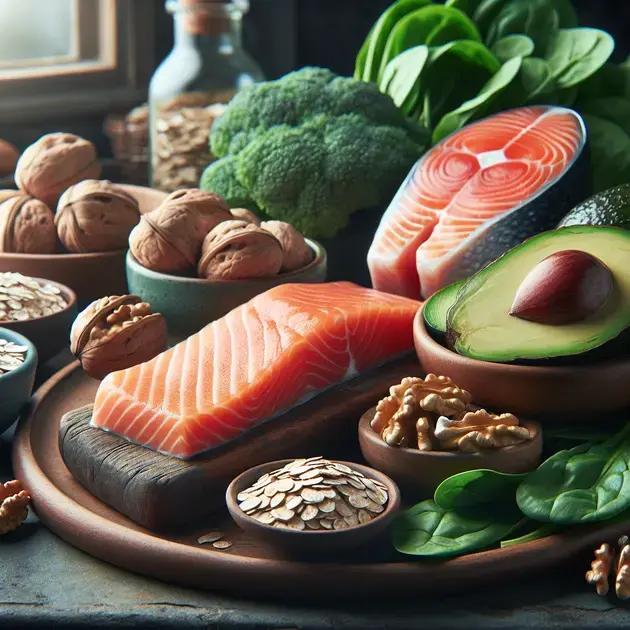Lower Your Cholesterol with These Foods is a topic that has gained significant attention in the health and wellness community. With heart disease being a leading cause of death worldwide, finding natural ways to lower cholesterol levels is crucial for maintaining good cardiovascular health.
Including specific foods in your diet can have a positive impact on reducing cholesterol levels. For example, incorporating walnuts, fatty fish like salmon, and plenty of fruits and vegetables rich in fiber can help lower LDL cholesterol and raise HDL cholesterol, promoting a healthy heart. By making simple but strategic changes to your daily meals, you can proactively improve your cholesterol levels and overall well-being.

Foods to Lower Your Cholesterol Naturally
Lowering your cholesterol levels can have a positive impact on heart health. One way to achieve this is by incorporating specific foods into your diet. Here are some foods that can help naturally lower your cholesterol:
1. Walnuts
Walnuts are rich in omega-3 fatty acids, which are known to help lower cholesterol levels. You can easily incorporate walnuts into your diet by sprinkling them on top of your morning oatmeal or salad. For a convenient way to track your walnut intake and cholesterol levels, you can use the “MyFitnessPal” app. This app allows you to log your daily food intake and monitor your nutritional values.
2. Salmon
Fatty fish like salmon are high in omega-3 fatty acids and can help lower bad cholesterol levels. Aim to include salmon in your meals at least twice a week. To find delicious salmon recipes and meal ideas, you can visit the “Epicurious” website. This site offers a wide range of heart-healthy recipes that include salmon as a key ingredient.
3. Oats
Oats contain beta-glucans, a type of soluble fiber that can help reduce cholesterol levels in the body. Start your day with a bowl of oatmeal topped with fresh fruits for a nutritious breakfast. If you’re looking for different ways to incorporate oats into your diet, you can check out the “EatingWell” app. This app provides oat-based recipes and meal plans to support heart health.
4. Avocados
Avocados are a great source of monounsaturated fats that can help improve cholesterol levels. Add sliced avocado to your sandwiches, salads, or smoothies for a creamy and nutritious boost. To discover creative avocado recipes and cooking tips, you can explore the “Food Network” website. This site features a variety of avocado-based dishes created by top chefs.
5. Spinach
Leafy greens like spinach are rich in lutein, a carotenoid that has been linked to lower cholesterol levels. Include spinach in your salads, smoothies, or omelets for a heart-healthy addition to your meals. For innovative ways to incorporate spinach into your cooking, you can refer to the “Allrecipes” app. This app offers user-generated spinach recipes and reviews to inspire your culinary adventures.

Incorporate Avocado and Flaxseed into Your Diet
Avocado and flaxseed are two superfoods that can greatly benefit your overall health when incorporated into your diet. Avocados are rich in monounsaturated fats, which are heart-healthy fats that can help lower bad cholesterol levels. They also contain fiber, which aids in digestion and helps you feel fuller for longer periods. Flaxseed, on the other hand, is an excellent source of omega-3 fatty acids, which are known to improve heart health and reduce inflammation in the body.
To start incorporating avocado and flaxseed into your diet, you can begin by adding sliced avocado to salads, smoothies, or sandwiches. You can also use avocado as a replacement for butter or mayonnaise in recipes. Flaxseed can be sprinkled on top of yogurt, oatmeal, or added to baked goods like muffins and bread. You can also use flaxseed oil as a dressing for salads or drizzle it over cooked vegetables.
By including these nutrient-rich foods in your meals, you can reap the benefits of their unique nutritional profiles and support your overall health and well-being.
Effective Ways to Improve Your Cholesterol Numbers
Improving your cholesterol numbers is essential for maintaining good heart health and reducing the risk of cardiovascular diseases. There are several effective ways to help lower cholesterol levels naturally. One of the most important steps is to focus on a healthy diet that includes foods known to improve cholesterol levels, such as avocados and flaxseed.
In addition to incorporating avocado and flaxseed into your diet, you can also reduce your intake of saturated and trans fats, which can raise bad cholesterol levels. Increasing your consumption of fiber-rich foods like fruits, vegetables, and whole grains can also help lower cholesterol. Regular exercise is another crucial factor in improving cholesterol numbers, as it can help lower bad cholesterol and raise good cholesterol levels.
Other lifestyle changes that can positively impact your cholesterol numbers include maintaining a healthy weight, quitting smoking, and managing stress. By implementing a combination of these strategies, you can effectively improve your cholesterol numbers and reduce the risk of heart disease.
The Role of Exercise in Lowering Cholesterol Levels
Exercise plays a significant role in lowering cholesterol levels and improving overall heart health. Regular physical activity can help raise good cholesterol (HDL) levels while lowering bad cholesterol (LDL) levels. It can also improve blood circulation, lower blood pressure, and reduce the risk of plaque buildup in the arteries.
Cardiovascular exercises like running, swimming, and cycling are particularly effective at improving cholesterol numbers. Aim for at least 150 minutes of moderate-intensity exercise per week, or 75 minutes of vigorous-intensity exercise to see benefits on your cholesterol levels. Strength training exercises can also contribute to lowering cholesterol levels by increasing muscle mass and boosting metabolism.
To incorporate exercise into your routine, start with activities you enjoy and gradually increase the intensity and duration. Consider working with a personal trainer or joining group fitness classes to stay motivated and accountable. By making exercise a regular part of your lifestyle, you can significantly impact your cholesterol numbers and improve your overall health.
Conclusion
Incorporating avocado and flaxseed into your diet can have significant benefits for your overall health. Avocados, rich in heart-healthy monounsaturated fats and fiber, can help lower bad cholesterol levels and promote satiety. Similarly, flaxseed, with its omega-3 fatty acids, contributes to improved heart health and reduced inflammation in the body.
By adding sliced avocado to salads, smoothies, or sandwiches, and incorporating flaxseed into various dishes, you can harness the unique nutritional profiles of these superfoods to support your well-being. Alongside dietary changes, focusing on a healthy eating regimen that includes these foods can aid in improving cholesterol numbers naturally, reducing the risk of cardiovascular diseases.
Moreover, combining a nutrient-rich diet with lifestyle adjustments like reducing intake of saturated fats, increasing fiber consumption, and engaging in regular exercise can further enhance your heart health. Exercise, particularly cardiovascular and strength training activities, plays a crucial role in lowering cholesterol levels, improving blood circulation, and reducing arterial plaque buildup.